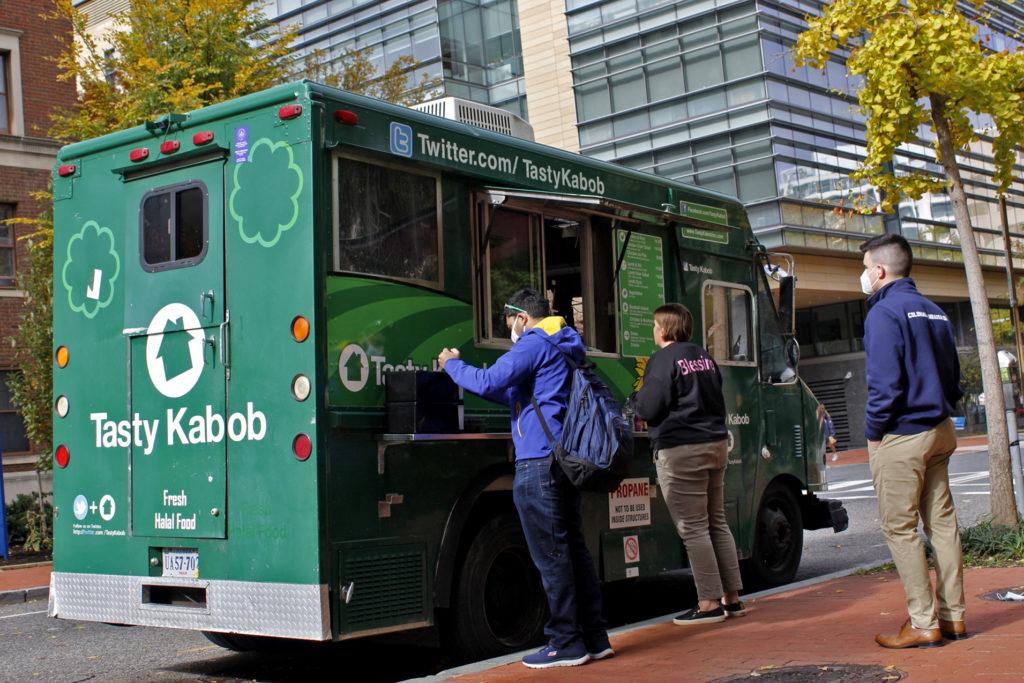Lines of students have flocked to the smells of new and familiar food trucks that have trickled back into Foggy Bottom in recent weeks, marking the return of the mobile businesses that disappeared during the pandemic.
Workers from more than half a dozen food trucks said they have reopened on campus this fall, stabilizing business after more than a year and a half of limbo caused by the pandemic. More than 10 restaurants have reopened in the months following the return of students to campus and workers say they’re happy to serve students on campus again in light of continued financial uncertainty throughout the pandemic.
Giovani Melchor, a cook at CaliBurger in Potomac Square, said business slowed last year, when about 90 percent of food trucks left the District due to low customer demand, WTOP reported last summer.
“This year is much better,” Melchor said. “Last year was really slow, but thank god this year has been perfect, and I think next year will be better.”
TwentyTables, a former food truck partner with the University, suspended service on campus last fall and removed most food trucks from campus after the program failed to reel in “consistent customers.” But as students have returned this fall, food trucks have followed.
“It’s one of the things that makes me really happy, hearing ‘This was good. The hamburger was delicious,’” Melchor said. “For me, it is a privilege to hear that. It’s my cooking, and it makes me happy that they enjoy my food.”
Darryl Mathis, the operations manager at the Roaming Coyote Truck located in Potomac Square, said the return of students to campus has helped him maintain stable business even during the pandemic. He said the business and students have a “mutually beneficial” relationship because the students have access to quick, quality food as the truck earns more money.
“As long as you guys enjoy the food, that’s really the big thing with us,” Mathis said. “We’re going to keep going back and making sure that the food’s good. We’ll do that as long as you guys keep eating. As long as you guys keep coming back and keep eating the food, we’ll be happy.”
The University offers two different food truck dining options for students living on campus – semi-permanent GWorld vendors, like TastyKabob and Yumpling on 22nd Street, and Curbside Kitchen trucks in Potomac Square. At the Curbside trucks, students can pre-order and view schedules of when food trucks will be on campus to purchase meals.
Curbside Kitchen has contracts with more than a dozen food trucks that serve food in groups of four in three-hour time slots during lunch and dinner hours Monday through Friday in Potomac Square.
Loan Tran, a cook at New Gourmet Delight in Potomac Square contracted through Curbside Kitchen, said the food truck program gives each truck a “fair opportunity” with similar amounts of time.
“They rotate us out and stuff, like what days to show up, what days not to, so they tried to give us a fair opportunity for every single truck to come in certain days and plus give you guys a different variety so you don’t see the same trucks to come over and over,” she said.
Nearly a dozen students said they’re happy food trucks are back and enjoy the rotation of options in Potomac Square, which they say provides diverse eating options.
Sophomore Anastasia Brickner said she is glad the food trucks are back because she can quickly and easily order food online and have it ready right after class. She said paying for her food during class with GWorld through the Curbside app makes dining more convenient.
“It gives you the ability to do what you can’t do in District, which is order ahead,” she said. “We literally just came from class. We were sitting in class ordering food and then immediately came out and got the food, so that’s a big plus.”
Brickner said she looks forward to eating at the Potomac Square food trucks after sitting in class all day because of the ability to eat outside in nice weather.
“I like being outside because being biomedical engineers, we’re super busy all the time,” she said. “But then we come here and get food from the food trucks and we spend more time outside.”
Chris Lierly, a second-year graduate student, said eating at the food trucks provides new variety to the available restaurants on campus as more dining options opened while students returned to classes. He said he can eat at fast food restaurants like Chick-fil-A anywhere, but Foggy Bottom food trucks, like the Thai food truck Ricebowl, offer cheap and unique dining options that he can’t find anywhere else.
“It’s diverse in its options, and the prices are, I would say, better than places that I’ve tried,” he said.
Lierly said he has thought of food trucks as safer solutions to indoor dining during the pandemic because the coronavirus can be transmitted more easily indoors, according to the Center for Disease Control and Prevention.
“Not only does it increase the experience, but it’s safer to begin with than an indoor dining option that’s enclosed inside of a building without ventilation,” Lierly said. “I think it’s a good, positive thing. I hope if any further COVID curveballs like Delta come in, that they don’t necessarily change the food truck situation.”







